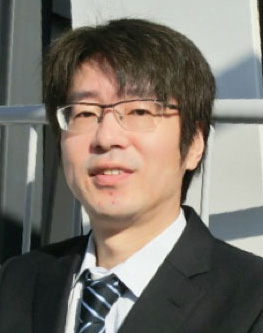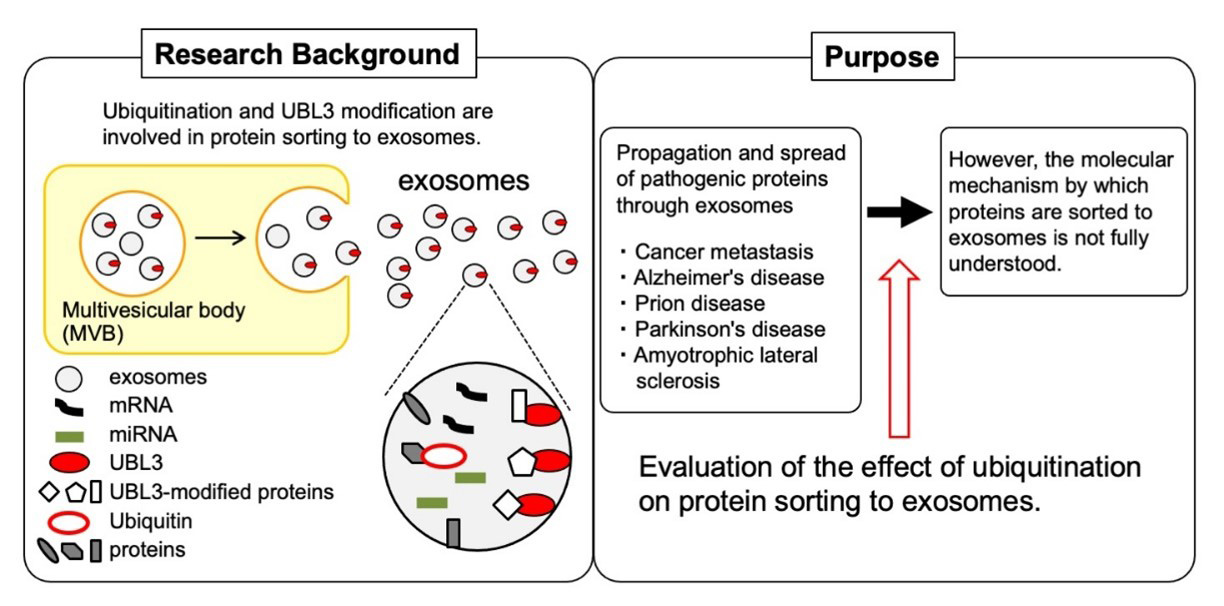Hiroshi Ageta
Analysis of ubiquitin-related molecules for protein sorting to exosomes by UBL3 chemo-technology
 |
Hiroshi Ageta, PhDFujita Health University, Institute for Comprehensive Medical Science (ICMS), |
|---|
Research summary
Exosomes are nano-sized biovesicles released from multivesicular bodies (MVB) which are also known as late endosomes and their size ranges from 50 to 100 nm. They are known as new intercellular communication factor because they are released from almost all types of cells such as stem cells, cancer cells, and nerve cells, and is taken up again by other cells and propagates their contents. Propagation by exosomes is also known to have important effects in angiogenesis, cancer invasion, cancer metastasis, and inflammatory response.
Recently, we had identified ubiquitin-like protein 3 (UBL3) as a novel and crucial posttranslational modification (PTM) factor different form conventional ubiquitination for the efficient protein sorting to exosomes. We found that UBL3 modification is indispensable for sorting of UBL3 to MVBs and exosomes. We also observed a 60% reduction of total protein levels in exosomes purified from Ubl3- knockout mice compared with those from wild-type mice. Furthermore, by comparing the sorting of GFP-tagged ubiquitin, SUMO, and UBL3 to exosomes, we found that ubiquitinated proteins were sorted to exosomes to a lesser extent compared with UBL3. By performing comprehensive proteomic analysis, we identified 50 ubiquitin-related molecules as UBL3-interacting proteins. Various cellular processes, including degradation, transcription, DNA repair, regulation of cell cycle, signal transduction and autophagy, are known to be regulated by ubiquitination. Therefore, we will investigate the effects of ubiquitin-related molecules on exosome sorting using cutting-edge chemo-technology that utilizes the unique characteristics of UBL3.

Publications
- Hitachi K, Nakatani M, Takasaki A, Ouchi Y, Uezumi A, Ageta H, Inagaki H, Kurahashi H, Tsuchida K.
Myogenin promoter-associated lncRNA Myoparr is essential for myogenic differentiation.
EMBO Rep. 20, e47468 (2019)
PMID: 30622218
Former Publications
- Ageta H, Kato A, Hatakeyama S, Nakayama K, Isojima Y, *Sugiyama H.
Regulation of the level of Vesl-1S/Homer-1a proteins by ubiquitin-proteasome proteolytic systems.
J. Biol. Chem. 276, 15893-15897 (2001)
PMID: 11278836 - Ageta H, Ikegami S, Miura M, Masuda M, Migishima R, Hino T, Takashima N, Murayama A, Sugino H, Setou M, Kida S, Yokoyama M, Hasegawa Y, Tsuchida K, Aosaki T, *Inokuchi K.
Activin plays a key role in the maintenance of long-term memory and late-LTP.
Learn. Mem. 17, 176-185 (2010)
PMID: 20332189 - Ageta H, *Tsuchida K.
Multifunctional roles of activins in the brain.
Vitam. Horm. 85, 185-206 (2011)
PMID: 21353881 - Ikeda D, Ageta H, Tsuchida K, *Yamada H.
iTRAQ-based proteomics reveals novel biomarkers of osteoarthritis.
Biomarkers 18, 565-572 (2013)
PMID: 23937207 - Ageta H, Ageta-Ishihara N, Hitachi K, Karayel O, Onouchi T, Yamaguchi H, Kahyo T, Hatanaka K, Ikegami K, Yoshioka Y, Nakamura K, Kosaka N, Nakatani M, Uezumi A, Ide T, Tsutsumi Y, Sugimura H, Kinoshita M, Ochiya T, Mann M, *Setou M, *Tsuchida K.
UBL3 modification influences protein sorting to small extracellular vesicles.
Nat. Commun. 9, 3936 (2018)
PMID: 30258067





